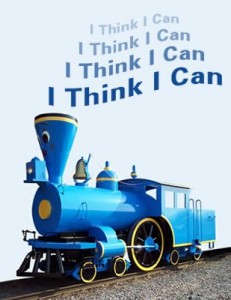 Can you help you? Recent research by University of Illinois Professor Dolores Albarracin and Visiting Assistant Professor Ibrahim Senay, along with Kenji Noguchi, Assistant Professor at Southern Mississippi University, has shown that those who ask themselves whether they will perform a task generally do better than those who tell themselves that they will. Little research exists in the area of self-talk, although we are aware of an inner voice in ourselves and in literature. From children’s books like “The Little Engine That Could,” in which the title character says, “I think I can,” to Holden Caulfield’s misanthropic musings in “A Catcher in the Rye,” internal dialogue often influences the way people motivate and shape their own behavior.
Can you help you? Recent research by University of Illinois Professor Dolores Albarracin and Visiting Assistant Professor Ibrahim Senay, along with Kenji Noguchi, Assistant Professor at Southern Mississippi University, has shown that those who ask themselves whether they will perform a task generally do better than those who tell themselves that they will. Little research exists in the area of self-talk, although we are aware of an inner voice in ourselves and in literature. From children’s books like “The Little Engine That Could,” in which the title character says, “I think I can,” to Holden Caulfield’s misanthropic musings in “A Catcher in the Rye,” internal dialogue often influences the way people motivate and shape their own behavior.
But was “The Little Engine” using the best motivational tool, or does “Bob the Builder” have the right idea when he asks, “Can we fix it?”
Albarracin’s team tested this kind of motivation in 50 study participants, encouraging them explicitly to either spend a minute wondering whether they would complete a task or telling themselves they would. The participants showed more success on an anagram task, rearranging set words to create different words, when they asked themselves whether they would complete it than when they told themselves they would.
Further experimentation had students in a seemingly unrelated task simply write two ostensibly unrelated sentences, either “I Will” or “Will I,” and then work on the same task. Participants did better when they wrote, “Will” followed by “I” even though they had no idea that the word writing related to the anagram task.
Why does this happen? Professor Albarracin’s team suspected that it was related to an unconscious formation of the question “Will I” and its effects on motivation. By asking themselves a question, people were more likely to build their own motivation.
Can you help you? Recent research by University of Illinois Professor Dolores Albarracin and Visiting Assistant Professor Ibrahim Senay, along with Kenji Noguchi, Assistant Professor at Southern Mississippi University, has shown that those who ask themselves whether they will perform a task generally do better than those who tell themselves that they will. Little research exists in the area of self-talk, although we are aware of an inner voice in ourselves and in literature. From children’s books like “The Little Engine That Could,” in which the title character says, “I think I can,” to Holden Caulfield’s misanthropic musings in “A Catcher in the Rye,” internal dialogue often influences the way people motivate and shape their own behavior.
But was “The Little Engine” using the best motivational tool, or does “Bob the Builder” have the right idea when he asks, “Can we fix it?”
Albarracin’s team tested this kind of motivation in 50 study participants, encouraging them explicitly to either spend a minute wondering whether they would complete a task or telling themselves they would. The participants showed more success on an anagram task, rearranging set words to create different words, when they asked themselves whether they would complete it than when they told themselves they would.
Further experimentation had students in a seemingly unrelated task simply write two ostensibly unrelated sentences, either “I Will” or “Will I,” and then work on the same task. Participants did better when they wrote, “Will” followed by “I” even though they had no idea that the word writing related to the anagram task.
Why does this happen? Professor Albarracin’s team suspected that it was related to an unconscious formation of the question “Will I” and its effects on motivation. By asking themselves a question, people were more likely to build their own motivation.
